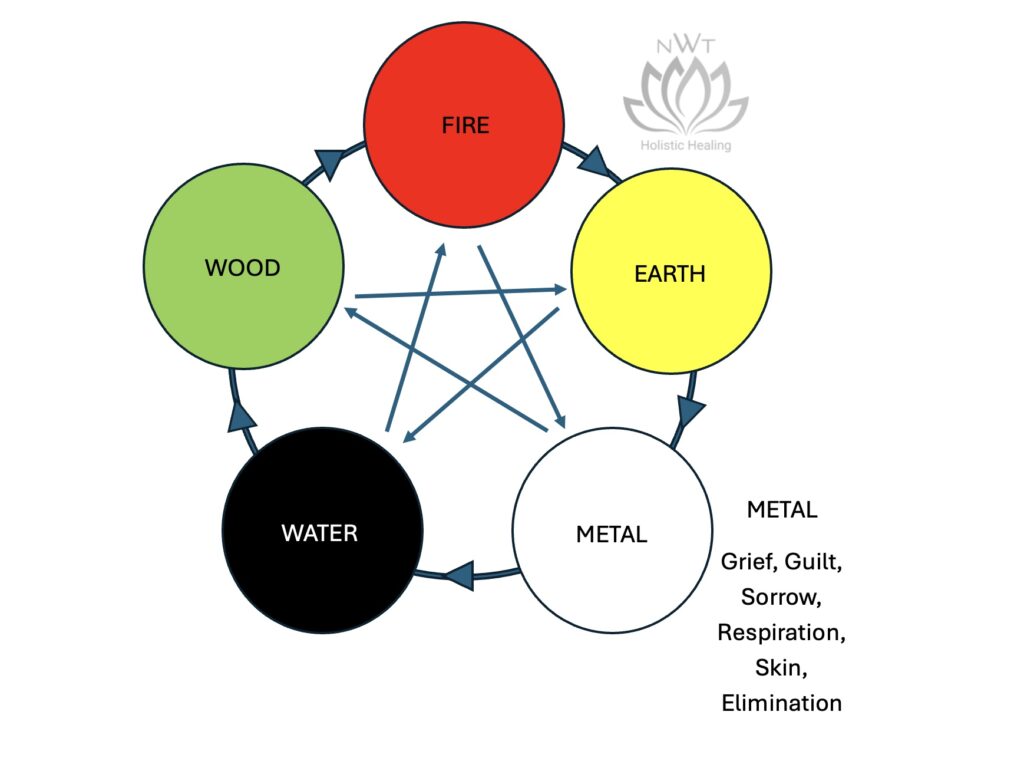Autumn brings a change of season, and with it, the chance to let go. Just like the trees shed their last fruits and then shed their leaves, we too can shed places, things, people, habits or situations that no longer serve us or may be preventing us from being the greatest version of ourselves.

Traditional Chinese Medicine (TCM) beautifully embodies the maxim“As above, so below, as within, so without” by viewing the body and the natural world as deeply interconnected. In TCM’s Five Element Theory, each element, Wood, Fire, Earth, Metal, and Water, reflects the cyclical changes in nature as well as within the human body. Each element is linked to a specific season, organs, emotions, and bodily functions, highlighting how our health fluctuates with seasonal changes and environmental influences. Striving for balance, TCM emphasises harmonising the opposing forces of YIN and YANG, helping to keep our bodies and minds healthy and in alignment with the world around us.

THE METAL ELEMENT
The Metal element is associated with Autumn, the Lungs, and the Large Intestine. It expresses distinct qualities that influence our emotional and psychological state.
Emotional Associations of the Metal element
- Grief and Sadness: Metal is primarily associated with grief. Healthy processing of grief allows us to let go of what is no longer needed and make space for the new, akin to the natural shedding in autumn. When there is an imbalance, unresolved or excessive grief may lead to prolonged sadness or detachment, affecting the Lungs and emotional resilience.
- Letting Go: The Metal element signifies letting go of the old to make way for the new, much like the autumn season when trees shed their leaves. Emotionally, this relates to releasing attachments, ideas, or relationships that no longer serve our growth or well-being.
- Sense of Value: Metal is also linked to value, respect, and self-worth. A balanced Metal element helps us recognize our own worth and develop a deep sense of respect, not only for ourselves but for others. This includes a keen ability to assess and find value in different aspects of life.
Psychological Associations of the Metal element
- Reflection and Introspection: Metal corresponds with introspection and an ability to look inward. This inward focus allows for deep thinking, self-assessment, and the appreciation of experiences, encouraging a grounded and discerning mindset.
- Order and Discipline: The Metal element embodies order, discipline, and structure, both psychologically and our environment. Those with strong Metal energy often value organisation, clarity, and precision, often feeling discomfort in chaotic or disorganized settings.
- Sense of Purpose: Metal’s relationship with value and clarity lends to a sense of purpose. A balanced Metal element allows for a clear understanding of our life purpose, values, and direction. When out of balance, this sense of purpose may become rigid or overly critical, as perfectionism can arise from an imbalanced Metal element.
- Boundaries and Protection: The Lungs, linked to the Metal element, are associated with boundaries and protecting what is within from external harm. This can manifest psychologically as a need for healthy boundaries in relationships and a strong sense of personal space and integrity.
Imbalance in Metal Element
- Emotional Signs: People with an imbalance in Metal might experience prolonged grief, inability to let go, isolation, melancholy, or lack of fulfilment. They may find themselves reminiscing about the past or unable to move forward from certain experiences.
- Psychological Signs: An excess of Metal energy may lead to excessive judgment, perfectionism, or detachment. On the other hand, a deficiency may lead to low self-worth, lack of direction, or an inability to maintain boundaries.
In essence, the Metal element in TCM fosters introspection, discipline, and the ability to process grief healthily. When balanced, it cultivates a sense of value and purpose; when imbalanced, it may bring about excessive grief, detachment, or a lack of self-worth.
Organ Associations of the Metal element
TCM shows how our breathing and digestion can be affected during this season. Autumn’s qualities are cool, dry, and inward-focused, aligning with the Metal element’s themes of purification, letting go, and consolidating energy.
Lungs: Respiration, Immunity, and Skin Health
- Respiratory Health: The Lungs, responsible for breathing, are considered highly sensitive to autumn’s dry and cool nature. Dry air can lead to respiratory issues such as dryness in the nose, throat, and Lungs, resulting in symptoms like cough, dryness, or even respiratory infections.
- Immunity: In TCM, the Lungs are responsible for “Wei Qi,” the body’s protective energy (similar to immunity). As autumn can bring a drop in temperatures, the body is more susceptible to colds, flu, and other respiratory infections, emphasizing the need to strengthen Lung Qi to bolster immunity.
- Skin and Body Moisture: The Lungs control the skin, opening through the nose and regulating moisture throughout the body. Dry autumn air can lead to dehydrated skin, chapping, and sensitivity, making hydration and moisturizing practices particularly beneficial in this season.
Large Intestine: Digestion, Elimination, and Letting Go
- Digestion and Waste Removal: The Large Intestine, working closely with the Lungs, is responsible for the final stage of digestion and the elimination of waste. Autumn’s energy supports processes of release and elimination, much like nature shedding leaves. Physically, it is a good time to support the digestive system, helping to clear waste and absorb nutrients.
- Constipation and Dryness: Autumn’s dryness can exacerbate constipation and digestive sluggishness, reflecting a lack of moisture in the Large Intestine. This season requires increased hydration and foods that promote bowel health, such as fiber-rich and moistening foods (e.g., pears, apples, and root vegetables).
- Emotional and Physical Letting Go: Just as nature lets go in autumn, the Large Intestine symbolizes the body’s need to release both physical and emotional waste. Holding onto toxins or emotions can disrupt the Large Intestine, leading to physical symptoms like bloating, indigestion, or constipation. Autumn is a time to support this process by eating seasonal foods and engaging in practices that aid release, both physically and emotionally.
Connecting with nature is key for TCM self-care practices. Mindfulness and meditation help us understand our thoughts and feelings, especially in autumn. Conscious breathing strengthens our Lungs, crucial for autumn health.
Self-care rituals that encourage reflection and gratitude are beneficial. Here are some ideas:
- Mindful walks in nature to observe the changing landscape
- Journaling about our thoughts and feelings
- Breathing exercises to boost lung capacity and calm the mind
- Spending time with loved ones to strengthen emotional connections
Being in tune with our surroundings helps us let go, a key autumn theme. By matching our practices with the season, we build a harmonious bond with ourselves and nature.

Autumn Health Tips for Balancing Yin and Yang
As autumn arrives, we can embrace this change by focusing on yin and yang balance. This season brings challenges and chances for better health. By eating nourishing foods and practicing self-care, we can care for our Lungs and Large Intestine.
Nourishing Foods for Lung and Large Intestine Health
Foods are key to our health in autumn. Eating foods that help our Lungs and Large Intestine is important. Here are some foods to add to your diet:
- Pears – Known for their hydrating properties, pears help moisten the Lungs and alleviate dryness.
- Radishes – These crunchy vegetables support digestive health and can help clear mucus.
- Warming spices – Incorporate ginger and cinnamon for their ability to support digestion and circulation.
- Soups and broths – Warm, nourishing soups can provide comfort and aid in digestion during cooler months.
Self-Care Practices to Support Seasonal Wellness
Our daily routines can greatly affect our well-being in autumn. We can improve our physical and emotional health with self-care. Here are some TCM self-care practices:
- Herbal remedies – Opt for herbal blends that focus on lung support and overall immune strength.
- Warm teas – Sipping on herbal teas can soothe the digestive system while keeping us hydrated.
- Qi Gong – Gentle exercises like Qi Gong can help us cultivate energy and maintain internal harmony.
- Stretching – Incorporating stretching into our daily routine can relieve tension and improve circulation.
Conclusion
As autumn arrives, we see its deep links within Traditional Chinese Medicine, especially with the Lungs and Large Intestine. This is a time for letting go, helping us reflect and release emotions which can bring us peace and better health.
Understanding how TCM works helps us connect with nature’s cycles. It allows our body and mind to work in harmony with the seasons.
Seasonal wellness is key as we move into the cooler months. The Lungs teach us about letting go of grief while the Large Intestine guides us to cleanse and purify. These lessons help us appreciate and bond with nature.
By using TCM in autumn, we can focus on boosting our immune system and emotional health. By eating correctly, taking care of ourselves, and releasing negative emotions, we walk the path towards better overall health, and we can enjoy a healthier winter. Let’s follow TCM’s wisdom to live a balanced life.


